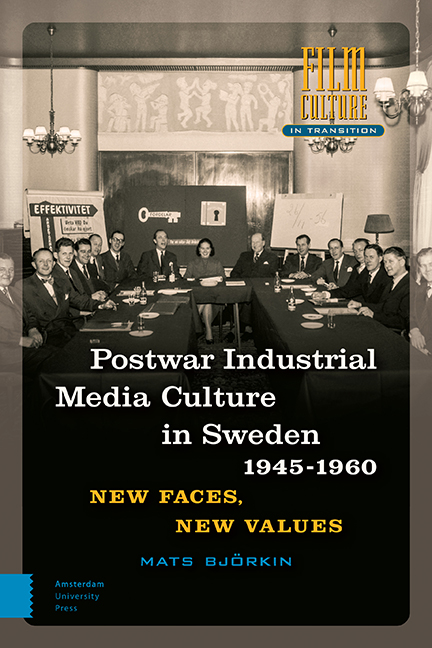Book contents
2 - Film and Swedish Industry in the World
Published online by Cambridge University Press: 20 January 2022
Summary
Abstract
Chapter 2 focuses on uses of industrial film among export-oriented large industries, and the infrastructure of industrial films in Sweden. The renewed interest in using films had its roots in the 1948 regulation of company work councils (företagsnämnder), which boosted the demand for economic information and which also went hand in hand with the policy work of the Swedish Employers’ Confederation (SAF) on increasing the public interest and acceptance of private enterprises and private ownership. A few years later the SAF established a human resources research and development organization called the PA Council, which helped industry to develop its own rhetoric and vocabulary, exemplified by applications of the term “contact.”
Keywords:industrial films, work councils, industry organizations, efficiency
“Do not just sell a vehicle – sell transport.” That was the credo of the 1953 sales conference at truck and bus manufacturer Scania-Vabis. The company had for more than 40 years designed, manufactured, and marketed trucks and buses. It had a strong position in the Swedish truck market, and dominated the public transport system. At a meeting with the International Road Union Technical Committee in Turin, in November 1957, the CEO of Scania-Vabis, Gösta Nilsson, argued that a
well-organized transport system is a prerequisite for economic and consequently social advancement, and industrial specialization in combination with the growth of production volume constantly increases the need for transport [and] the means of transport increasingly becoming a means of production. It is equally important that our roads are operated by rational and economical trucks, just like we have efficient machines in our factories.
Service, systems, and efficiency, as well as communication and selling, there are some of the themes of business and industry – and public policy – discourses and practices in Sweden during the 1950s. The Swedish twist is that public policy so strongly involved consumer behaviour and consumeroriented industry perspectives.
In 1958 they all merged, when a radio producer at Radio Luxemburg offered to pay 100,000 French francs per kilogram of ice left over from a three-ton ice block transported by an unrefrigerated truck from the Arctic Circle to the Equator. Norwegian insulation material manufacturer Glassvatt and Scania-Vabis answered the challenge.
- Type
- Chapter
- Information
- Postwar Industrial Media Culture in Sweden, 1945–1960New Faces, New Values, pp. 69 - 98Publisher: Amsterdam University PressPrint publication year: 2021



